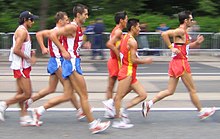| Athletics 100-kilometer walk | |
|---|---|
 Men's racewalk. Walker at right appears to be illegal in that both feet are off the ground, but an infraction is only committed when loss of contact is visible to the human eye. [1] | |
| Characteristics | |
| Category | Racewalking event |

The 100-kilometer race walk is a racewalking event. The event is competed as a road race. Athletes must always keep in contact with the ground and the supporting leg must remain straight until the raised leg passes it.